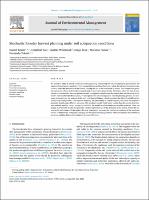Stochastic forestry harvest planning under soil compaction conditions
Date
2021-06-06Author
Rossit, Daniel Alejandro
Pais, Cristóbal
Weintraub, Andrés
Broz, Diego Ricardo
Frutos, Mariano
Tohmé, Fernando Abel
Metadata
Show full item recordAbstract
We present a study of annual forestry harvesting planning considering the risk of compaction generated by the transit of heavy forestry machinery. Soil compaction is a problem that occurs when the soil loses its natural resistance to resist the movement of machinery, causing the soil to be compacted in excess. This compaction generates unwanted effects on both the ecosystem and its economic sustainability. Therefore, when the risk of compaction is considerable, harvest operations must be stopped, complicating the annual plan and incurring in excessive costs to alleviate the situation. To incorporate the risk of compaction into the planning process, it is necessary to incorporate the analysis of the soil's hydrological balance, which combines the effect of rainfall and potential evapotranspiration. This requires analyzing the uncertainty of rainfall regimes, for which we propose a stochastic model under different scenarios. This stochastic model yields better results than the current deterministic methods used by lumber companies. Initially, the model is solved analyzing monthly scenarios. Then, we change to a biweekly model that provides a better representation of the dynamics of the system. While this improves the performance of the model, this new formulation increases the number of scenarios of the stochastic model. To address this complexity, we apply the Progressive Hedging method, which decomposes the problem in scenarios, yielding high-quality solutions in reasonable time.
Collections
The following license files are associated with this item:



